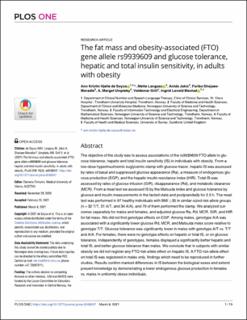| dc.contributor.author | De Soysa, Ann Kristin Hjelle | |
| dc.contributor.author | Langaas, Mette | |
| dc.contributor.author | Jakic, Anida | |
| dc.contributor.author | Shojaee-Moradie, Fariba | |
| dc.contributor.author | Umpleby, A. Margot | |
| dc.contributor.author | Grill, Valdemar Erik Robert | |
| dc.contributor.author | Mostad, Ingrid Løvold | |
| dc.date.accessioned | 2021-09-13T06:52:39Z | |
| dc.date.available | 2021-09-13T06:52:39Z | |
| dc.date.created | 2021-09-02T19:27:55Z | |
| dc.date.issued | 2021 | |
| dc.identifier.citation | PLOS ONE. 2021, 16 (3), 1-19. | en_US |
| dc.identifier.issn | 1932-6203 | |
| dc.identifier.uri | https://hdl.handle.net/11250/2775336 | |
| dc.description.abstract | The objective of the study was to assess associations of the rs9939609 FTO allele to glucose tolerance, hepatic and total insulin sensitivity (IS) in individuals with obesity. From a low-dose hyperinsulinemic euglycemic clamp with glucose-tracer, hepatic IS was assessed by rates of basal and suppressed glucose appearance (Ra), a measure of endogenous glucose production (EGP), and the hepatic insulin resistance index (HIR). Total IS was assessed by rates of glucose infusion (GIR), disappearance (Rd), and metabolic clearance (MCR). From a meal test we assessed IS by the Matsuda index and glucose tolerance by glucose and insulin measurements in the fasted state and postprandially for 2.5 h. The meal test was performed in 97 healthy individuals with BMI ≥35 in similar-sized risk-allele groups (n = 32 T/T, 31 A/T, and 34 A/A), and 79 of them performed the clamp. We analyzed outcomes separately for males and females, and adjusted glucose Ra, Rd, MCR, GIR, and HIR for fat mass. We did not find genotype effects on EGP. Among males, genotype A/A was associated with a significantly lower glucose Rd, MCR, and Matsuda index score relative to genotype T/T. Glucose tolerance was significantly lower in males with genotype A/T vs. T/T and A/A. For females, there were no genotype effects on hepatic or total IS, or on glucose tolerance. Independently of genotypes, females displayed a significantly better hepatic and total IS, and better glucose tolerance than males. We conclude that in subjects with similar obesity we did not register any FTO risk-allele effect on hepatic IS. A FTO risk-allele effect on total IS was registered in males only, findings which need to be reproduced in further studies. Results confirm marked differences in IS between the biological sexes and extend present knowledge by demonstrating a lower endogenous glucose production in females vs. males in uniformly obese individuals. | en_US |
| dc.language.iso | eng | en_US |
| dc.publisher | Public Library of Science, PLOS | en_US |
| dc.rights | Navngivelse 4.0 Internasjonal | * |
| dc.rights.uri | http://creativecommons.org/licenses/by/4.0/deed.no | * |
| dc.title | The fat mass and obesity-associated (FTO) gene allele rs9939609 and glucose tolerance, hepatic and total insulin sensitivity, in adults with obesity | en_US |
| dc.type | Peer reviewed | en_US |
| dc.type | Journal article | en_US |
| dc.description.version | publishedVersion | en_US |
| dc.source.pagenumber | 1-19 | en_US |
| dc.source.volume | 16 | en_US |
| dc.source.journal | PLOS ONE | en_US |
| dc.source.issue | 3 | en_US |
| dc.identifier.doi | 10.1371/journal.pone.0248247 | |
| dc.identifier.cristin | 1930972 | |
| dc.description.localcode | Copyright: © 2021 de Soysa et al. This is an open access article distributed under the terms of the Creative Commons Attribution License, which permits unrestricted use, distribution, and reproduction in any medium, provided the original author and source are credited. | en_US |
| cristin.ispublished | true | |
| cristin.fulltext | original | |
| cristin.qualitycode | 1 | |

